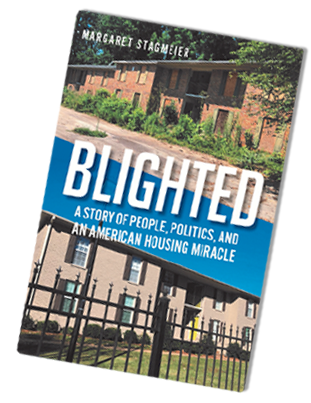Dubbed “The Compassionate Capitalist” by the media, Marjy Stagmeier is an affordable housing solutionist and a champion of an affordable housing-education model successfully piloted within the nonprofit she founded, Atlanta-based Star-C Programs. Over the course of her career, Stagmeier has purchased, renovated, and managed more than 3,000 legacy apartment units, for the past eight years as co-founder of Tristar, a nationally recognized real estate investment firm in Atlanta. Stagmeier led TriStar to develop its sustainable housing model that targets blighted and marginalized apartment communities near failing elementary schools. In addition to creating affordable, quality workforce housing, Stagmeier and TriStar’s pioneering partnerships with educators, medical professionals, municipalities, non-profits and foundations are reducing tenant transiency and improving outcomes through free after-school programs and summer camps, access to affordable health care and community gardening. A graduate of Georgia State University, she passed the Georgia CPA exam, is the former board chair of the Atlanta Community Food Bank, former vice president of the Atlanta Commercial Board of Realtors, and the author of Real Estate Asset Management: Executive Strategies for Profit Making. Stagmeier also is active in HouseAtl and other organizations dedicated to equitable housing. She lives in Atlanta with her husband, John. Her goal with Blighted, Star-C and, increasingly, with TriStar’s work, is to create an equitable housing-education movement, starting with and always improving upon the open-source model presented in this book.
Marjy: I was invited into a meeting with Bill and Melinda Gates, Matthew Desmond and some other landlords to discuss income mobility (low-income families moving to middle class). After sharing our “eduhousing” model, I was encouraged by Matthew, author of “Evicted” to document my work.
At the time, we had a signed a letter of intent to purchase Summerdale, so I started documenting the business progress. I’ve never really spent time with tenants before in their apartments other than inspections, but asked Lucy (property manager) to see if any tenant would be interested in an interview. Ms. Humphries and Ms. Mary were the first two tenants to sign up.
Ms. Humphries is proud to be the longest reigning tenant at Summerdale. She is a very sweet, fiercely religious lady who loves her family and Summerdale. It was surprising to see her loyalty to the property, despite the drug dealers, crime and impact on the mental health of her family. Her daughter was skeptical that they were still living at Summerdale, especially since her mother sold a house (in a high-crime area) to become a renter. Her granddaughter was equally as skeptical but she is devoted to her grandmother and won’t leave her alone at Summerdale.
I am often asked “are you scared” when walking the property – especially through the obvious drug dealers. The answer is “yes” and very cautious. I always remember that Summerdale is home to Ms. Humphries, Ms. Mary, Mr. Alford and many other long-term tenants. The devotion by the law-abiding tenants gives me courage to operate Summerdale and make it safer.
Melinda Wyatt was gracious during her interviews. I met her when Jeff and I were inspecting her unit and was appalled by the condition. Roaches were crawling throughout the kitchen and trash and clothes were scattered everywhere. She was racist and rude to our staff, but calm and patient when I met her. I attended her eviction hearing in Fulton County court, where we reached a settlement for her to vacate her unit. She was stylishly dressed and groomed. No one would ever guess the filthy environment she was harboring in her apartment. She was an aggressive tiger if slightly provoked but overall concerned that her children had good manners. I saw the impact of extreme poverty through Melinda’s personality. If she had grown up in a safe, stable environment, she would no doubt have a completely different lifestyle.
COVID-19 impacted Summerdale. So many of our families are single parents with young children who were stuck in their apartments. We had challenges with our internet provider and Summerdale is clearly in the ‘digital divide’. On two families had a usable computer when the schools closed and children were sent to learn from home. Dr. Payne and Atlanta Public Schools did an honorable job in quickly securing computers and digital hot spots for the children. Unfortunately, many of the families still did not attend on-line learning sessions. We learned that the parents or siblings took the computers for their own job or personal use.
We had so many tenants who just stopped paying rent the minute the President issued the eviction moratorium in 2020. The tenants refused to pay even if they continued to work full-time and collect various government checks. Many just heard they could not be evicted and interpreted this as permission not to pay rent. We are morally torn on the eviction process. I agree that landlords need to be patient with tenants who have legitimate reasons for late payment, but after seeing tenant behavior and refusal to even work with us with rental assistance programs, eviction is the only option. Once the moratorium was lifted, we sent eviction letters to over 40 tenants and many of them immediately contacted us to scream or set up rental payments. However, some of these tenants illegally sublet their apartments to friends or family members, who refused to pay rent. It is taking over a year for the eviction process to be completed. I am hearing from landlords that some tenants owe them over $35,000 or two years back rent. The jurisdictional halt of evictions is devastating many landlords who must now increase rental rates to cover the losses from the non-paying tenants. It’s not fair to the existing good tenants.
